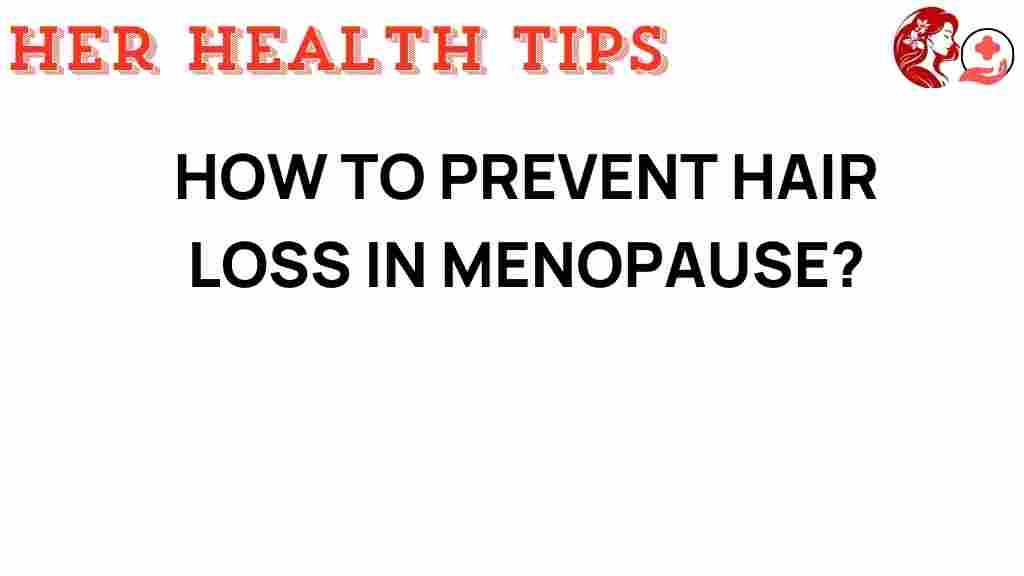Unlocking the Secrets: How to Prevent Hair Loss During Menopause
Menopause is a significant life transition for women that brings about various physical and emotional changes. One of the less talked about effects of menopause is hair loss. The hormonal changes that occur during this period can lead to thinning hair and even bald patches. Understanding the reasons behind hair loss and exploring effective prevention strategies is crucial for maintaining women’s health during menopause. In this article, we will delve into the causes of hair loss during menopause, effective prevention methods, and self-care tips that can help you retain your luscious locks.
Understanding Hair Loss During Menopause
As women approach menopause, their bodies undergo various hormonal changes, primarily a decrease in estrogen and progesterone. These hormonal shifts can lead to several changes in hair health, including:
- Thinning Hair: Many women notice their hair becoming finer and less voluminous.
- Increased Shedding: Hormonal changes can trigger more hair to enter the shedding phase.
- Changes in Hair Texture: Hair may become dry and brittle, making it more prone to breakage.
These changes can be distressing, but understanding the underlying causes can empower women to take proactive steps towards prevention.
Causes of Hair Loss During Menopause
Several factors contribute to hair loss during menopause:
- Hormonal Changes: The primary culprit is the drop in estrogen levels, which can disrupt the hair growth cycle.
- Genetics: Family history can play a significant role in hair loss patterns.
- Nutritional Deficiencies: A lack of essential vitamins and minerals can impact hair health.
- Stress: Emotional stress and anxiety can exacerbate hair loss.
- Medical Conditions: Conditions such as thyroid disorders can also contribute to hair thinning.
Step-by-Step Guide to Preventing Hair Loss
Now that we understand the causes, let’s explore effective strategies for preventing hair loss during menopause.
1. Focus on Nutrition
Your diet plays a vital role in maintaining healthy hair. Here are some key nutrients to include:
- Protein: Hair is primarily made of protein, so ensure you consume adequate amounts. Incorporate foods like eggs, fish, nuts, and legumes.
- Iron: Low iron levels can lead to hair loss. Include iron-rich foods like spinach, red meat, and lentils.
- Omega-3 Fatty Acids: These healthy fats promote hair health. Sources include fatty fish, flaxseeds, and walnuts.
- Vitamins: Vitamins A, C, D, and E, along with biotin and folate, are essential for hair growth. Consider fruits, vegetables, and whole grains to meet these needs.
2. Maintain Scalp Care
A healthy scalp is crucial for hair growth. Here are some scalp care tips:
- Regular Cleansing: Keep your scalp clean by using gentle shampoos that don’t strip natural oils.
- Massage: Scalp massages can improve blood circulation to hair follicles, promoting growth.
- Hydration: Use conditioners and hydrating hair masks to keep your scalp moisturized.
3. Manage Stress Effectively
Stress management is essential for overall health and can significantly impact hair loss. Consider these stress-reducing techniques:
- Exercise: Regular physical activity helps reduce stress levels.
- Meditation and Yoga: Mindfulness practices can enhance mental well-being.
- Hobbies: Engaging in enjoyable activities can relieve stress and improve your mood.
4. Consider Hormone Replacement Therapy (HRT)
For some women, hormone replacement therapy (HRT) may be an option to counteract the effects of hormonal changes. Consult your healthcare provider to discuss the potential benefits and risks of HRT as part of your menopause management plan.
5. Use Hair Care Products Wisely
Select hair care products that are gentle and designed for thinning hair. Look for:
- Thickening Shampoos and Conditioners: These products can add volume and fullness to your hair.
- Avoid Harsh Chemicals: Stay away from products containing sulfates and parabens that can damage hair.
- Heat Protection: Use heat protectants when styling your hair to minimize damage.
Troubleshooting Common Hair Loss Issues
Even with the best prevention strategies, some women may still experience hair loss. Here are some troubleshooting tips:
1. Identify Underlying Health Issues
If you notice significant hair loss, consult with a healthcare professional to rule out medical conditions such as thyroid disorders or anemia. Early detection can lead to better outcomes.
2. Adjust Your Diet
If you suspect nutritional deficiencies, consider working with a nutritionist to tailor a diet that meets your specific needs. You might also consider supplements after consulting a healthcare provider.
3. Reevaluate Stress Management Techniques
If stress is a significant factor, it may be beneficial to explore new stress management techniques or seek professional support such as therapy.
4. Review Hair Care Routines
Take a close look at your hair care routine. Overwashing, excessive heat styling, or using the wrong products can exacerbate hair loss. Make adjustments as necessary.
Emphasizing Self-Care
Self-care is crucial during menopause. Here are some self-care tips to consider:
- Stay Hydrated: Drink plenty of water to keep your body and hair hydrated.
- Prioritize Sleep: Aim for 7-9 hours of quality sleep each night to help your body recover and rejuvenate.
- Stay Connected: Maintain social connections to support your mental health during this transition.
- Seek Support: Consider joining a support group or engaging in community activities to share experiences and gain insights.
Conclusion
Preventing hair loss during menopause is a multifaceted approach that involves understanding hormonal changes, adopting a nutritious diet, maintaining scalp care, managing stress, and prioritizing self-care. By implementing these strategies, you can take control of your hair health during this transformative phase of life.
Remember, if you experience significant hair loss, it’s essential to consult a healthcare professional for personalized advice and treatment options. Embrace this new chapter with confidence, knowing that you have the tools to maintain your hair health.
For additional resources on women’s health during menopause, visit this link. For more information on hair care products, check out this external resource.
This article is in the category Conditions and created by HerHealthTips Team
